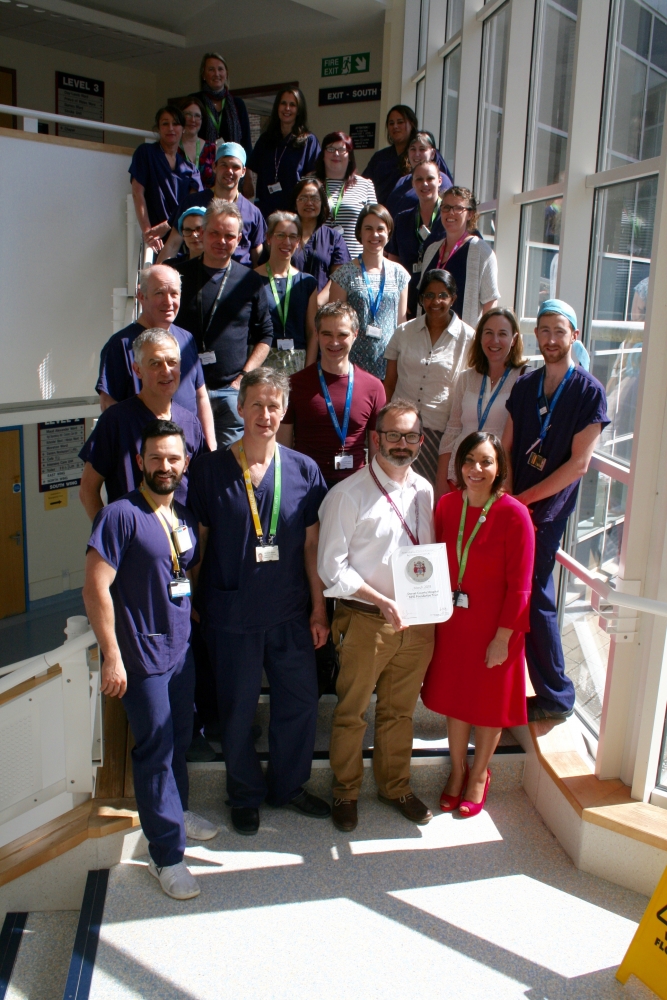Our journey to ACSA at Dorset County Hospital
The expectations of life depend upon diligence; the mechanic that would perfect his work must first sharpen his tools.
From reading previous articles in the Bulletin by other departments who chose to engage in ACSA, it is clear that many started the process despite a questioning and sceptical department. Our path towards accreditation started in a similar vein back in 2014, with a raised eyebrow or two and the standard questions of ‘why?’, ‘what?’, and ‘how much?’
ACSA provided both the platform and tools to reassure our department that we had many of the required policies, guidance, personnel and procedures in place. It also highlighted the gaps in our service provision and quality which had not kept up with recent clinical developments and changes in practice. Or as Confucius say, which tools needed sharpening.
Once the consultant body had agreed to engage with ACSA, work on the gap analysis started in earnest late in 2016. The clinical director and I divided up the ACSA standards into specialty groups and areas of departmental SPA responsibility (beware what you claim to do in your SPA time). Once allocated to relevant individuals, we requested feedback on where we stood between the requirements of the standard and our current practice. This included beginning to collate evidence and battling our hospital intranet to confirm that the policies and departmental guidelines listed were accessible, relevant and in-date.
Over the ensuing months colleagues tolerated my incessant requests, nagging, chasing, and reminding. This was the time-consuming aspect. I have great colleagues who supported and engaged with the ACSA process, but we are all busy and collating evidence takes time. By early 2017 we decided that we had made enough progress to request a visit which was booked for November.
Having this deadline helped move the process forward. It was also an opportunity for the wider theatre teams to get involved with reviewing the theatre facility, drug cupboards, training logs, theatre security, patient information and collating audit data on activity. The joy of any department is that we all bring a mix of different approaches to meeting any objective. Some love to get the work done early, some will spread it out over time and some love to see me sweat only to pull it out of the bag at the last minute (you know who you are...).
By early 2017 we decided that we had made enough progress to request a visit which was booked for November. Having this deadline helped move the process forward. It was also an opportunity for the wider theatre teams to get involved with reviewing the theatre facility, drug cupboards, training logs, theatre security, patient information and collating audit data on activity.
With two months to go, and with the help of our IT department (yes, I did say help and IT in the same sentence), we started uploading relevant policies and guidance to a web-based portal which enabled the review team to have sight of documents prior to the review. Whilst adding to the work, we felt that this would give the review team a clearer idea of who we were and how we worked and help them get a better idea of the challenges and the successes of our department.
Finally, after a huge departmental effort, the two day of on-site review took place. The team themselves were polite, approachable and thorough. Whilst it is not possible to assess all ACSA standards in a two-day visit, it felt like they left no stone unturned. The visit was an opportunity for the department to show how we work and to demonstrate how we have overcome a number of challenges. The theatre staff also rose to the occasion both as a source of information to help the team triangulate compliance with the standards and when given the opportunity to showcase their department.
Every department has a culture at its heart and this approach to clinical care is not something that it developed overnight. Our accreditation has enabled us to reflect on and demonstrate the hard work and dedication of many colleagues both past and present who have set the standards we now benefit from. As a team we have taken pride in our accreditation and in so doing successfully withstood the rigours of external scrutiny, benchmarked ourselves against nationally agreed standards and against other anaesthetic departments. Working towards accreditation gave the department a common purpose and an opportunity to involve the whole theatre community in reviewing how we work, and why we do what we do. As John Ruskin said “Quality is never an accident. It is the result of intelligent effort.” ACSA has proved this to be true, the effort involved should not be underestimated, but as a process which improves quality of patient care, it is worth it.

ACSA lead, Dorset County Hospital and co-opted member of the ACSA Committee.
